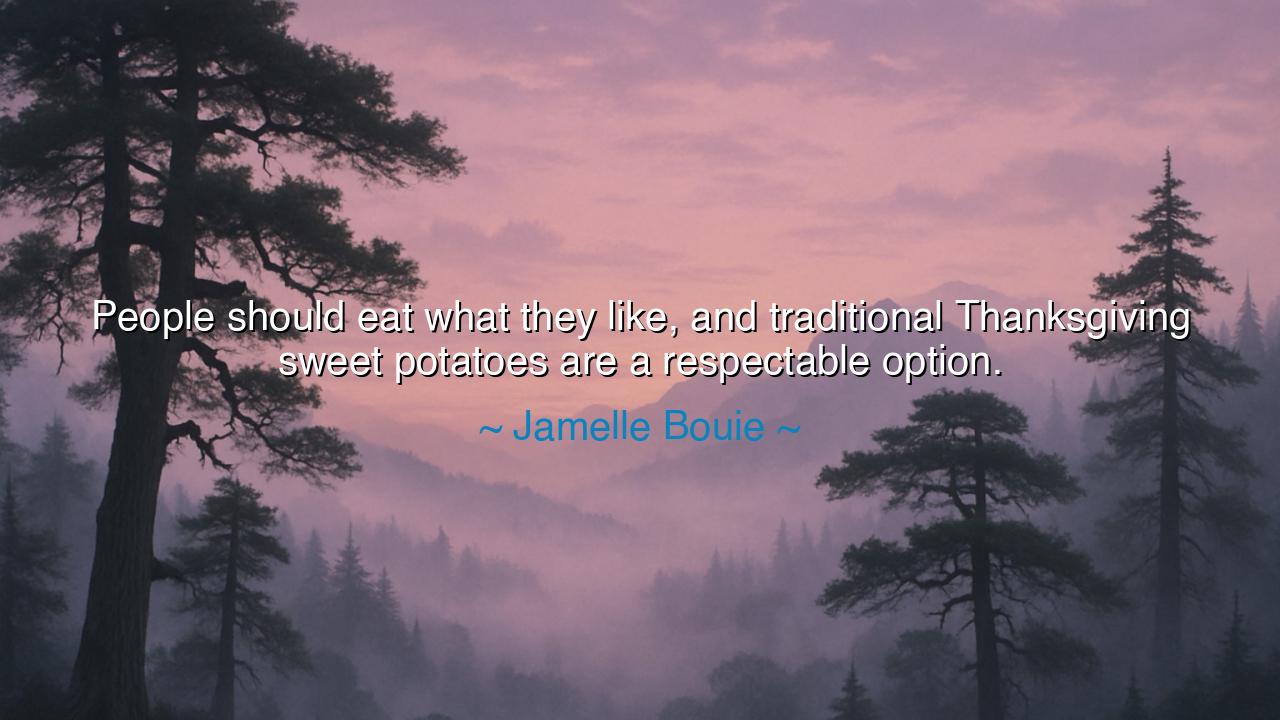
People should eat what they like, and traditional Thanksgiving
People should eat what they like, and traditional Thanksgiving sweet potatoes are a respectable option.






Jamelle Bouie once declared with clarity and balance: “People should eat what they like, and traditional Thanksgiving sweet potatoes are a respectable option.” These words, simple in form, carry the weight of a philosophy that reaches beyond food into the essence of tradition, choice, and freedom. For they remind us that joy in life is not found in rigid conformity, but in the respectful blending of custom and personal delight.
The origin of this saying lies in Bouie’s reflections as a cultural commentator, one who often examines the rituals and habits that bind society together. Thanksgiving, with its heavy table of foods—turkey, stuffing, cranberries, and sweet potatoes—has long been a feast laden with expectation. To many, the dishes are symbols, immutable parts of the ritual. Yet Bouie reminds us that tradition need not be tyranny. Sweet potatoes, whether adorned with marshmallows or roasted in humble simplicity, are not commandments but offerings. They are respectable, yes—but they are not compulsory.
History reveals this same lesson. In the first Thanksgiving of 1621, the foods were not yet codified into the menu we know today. The Pilgrims and the Wampanoag ate what was available: venison, fish, wild fowl, corn, and squash. There was no rigid recipe, no dictate from heaven that the feast must always look the same. Instead, it was an act of gratitude, shaped by the land and by the hands of those who prepared it. The uniformity of dishes came later, as culture hardened into ritual. Bouie’s wisdom pulls us back to the roots: eat what you love, and give thanks as you do.
The mention of sweet potatoes carries its own significance, for this food, deeply tied to African American and Southern traditions, has long been a dish of heritage and pride. To honor them at the table is to honor the generations who made much from little, who transformed humble roots into symbols of celebration. Yet Bouie does not exalt them above all other dishes; he merely calls them respectable. In this humility, he reminds us that tradition should invite, not command. Each dish is worthy, but none is supreme.
This wisdom shines a light on human life beyond the table. How often do we bind ourselves with unnecessary rigidity, mistaking custom for law, preference for virtue? Just as one may choose sweet potatoes or decline them, so too may each person walk their own path while still honoring the whole. Unity is not uniformity. The family gathered at Thanksgiving may differ in taste, in belief, in desire, yet still share the same table with love. Respect for each other’s choices is the true seasoning of the feast.
Consider the example of the Roman philosopher Epicurus, who taught that the purpose of eating was not excess, nor rigid tradition, but the cultivation of pleasure and contentment. He and his students often dined on bread, olives, and cheese, rejoicing in simplicity. If a man brought wine or figs, it was welcomed, but never demanded. Bouie’s teaching echoes this ancient wisdom: eat what brings you joy, respect what others love, and let gratitude bind the feast together.
So, O listener, take this teaching to heart. When the table is laid before you, do not scorn the foods you do not prefer, nor impose your tastes on others. Choose what you like with gratitude, honor the traditions that bring comfort, and respect the dishes that carry memory even if they are not your own. For the essence of Thanksgiving is not the sweet potato nor the turkey, but the spirit of thankfulness and respect. In your life as at your table, let joy guide your choices, and let respect guide your fellowship. In this way, every feast becomes not only respectable, but holy.






AAdministratorAdministrator
Welcome, honored guests. Please leave a comment, we will respond soon